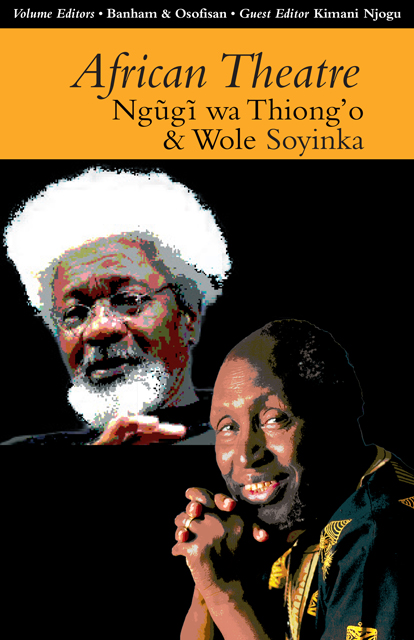Book contents
- Frontmatter
- Contents
- Notes on Contributors
- Obituary of Pat Amadu Maddy
- Introduction
- Reading & Performing African Drama: How Wole Soyinka & Ngũgĩ wa Thiong’o influenced my work
- Ayan Contra Ujamaa: Soyinka & Ngũgĩ as theatre theorists
- Encounters with Soyinka
- Encounters with Ngugi
- Wole Soyinka & Ngũgĩ wa Thiong’o: Plays in Production
- The Making of The Trial of Dedan Kĩmathi by Ngũgĩ wa Thiong’o & Mĩcere Gĩthae Mũgo at the University of California, Irvine: A personal reflection
- Playscript: A Rain of Stones
- Book Reviews
II - Producing I Will Marry When I Want in South Africa
Published online by Cambridge University Press: 23 February 2023
- Frontmatter
- Contents
- Notes on Contributors
- Obituary of Pat Amadu Maddy
- Introduction
- Reading & Performing African Drama: How Wole Soyinka & Ngũgĩ wa Thiong’o influenced my work
- Ayan Contra Ujamaa: Soyinka & Ngũgĩ as theatre theorists
- Encounters with Soyinka
- Encounters with Ngugi
- Wole Soyinka & Ngũgĩ wa Thiong’o: Plays in Production
- The Making of The Trial of Dedan Kĩmathi by Ngũgĩ wa Thiong’o & Mĩcere Gĩthae Mũgo at the University of California, Irvine: A personal reflection
- Playscript: A Rain of Stones
- Book Reviews
Summary
From casual conversations that I had had with a variety of theatre practitioners in Nairobi, I had gathered that Ngũgĩ wa Thiong’o’s plays were extremely difficult, if not impossible, to stage. Their main problem was the huge cast required to give life to the many characters in them. How can a theatre practitioner anywhere in the world, mostly working with minimum funding, hope to stage a work so demanding without collapsing? A huge cast requires many hours of rehearsing, an expensive wardrobe, managerial stress from the massaging of the numerous actors’ and actresses’ egos, and a suitable venue for the eventual staging of the work. Add to these problems the very nature of a Nairobi audience that has since the early 1990s been nurtured on theatre work that is constantly oscillating between slapstick comedy and farces by British writers that entwine salacious attitudes with witty dialogue. Never mind that Ngũgĩ wa Thiong’o is a renowned writer, so the conversations went, the average Kenyan theatre-goer has no respect for ‘serious’ drama. Sadly, this thoughtline still permeates the psyche of the Kenyan theatre practitioner until, sometimes some donor or other comes along, funds a project or two and disappears.
In 2003, Professor Malcolm Purkey of the University of Witwatersrand asked me to consider staging any play by a major African writer at the Wits Amphitheatre in Johannesburg, South Africa, where I was about to graduate with a Masters Degree in Dramatic Arts. I was seduced immediately by the idea of working on Wole Soyinka’s Death and the King’s Horseman which I admired immensely. But there was this constant niggling within me to try out something risqué, a troublesome play. I thought I needed an unfinished play or at least one that would engage me in a way that wasn’t usual for a director. Death and the King’s Horseman, is technically a well ‘finished’ play whose characters face interesting choices but whose fates are tied, sometimes, to forces beyond them. That was exciting enough, yet in my directorial mind I felt I needed a play that had a possibility of action from the characters’ point of view – without some external force pushing them into action. This internal debate was interesting as it took me through readings of works by a multitude of writers.
- Type
- Chapter
- Information
- African Theatre 13Ngugi wa Thiong'o and Wole Soyinka, pp. 42 - 47Publisher: Boydell & BrewerPrint publication year: 2014



